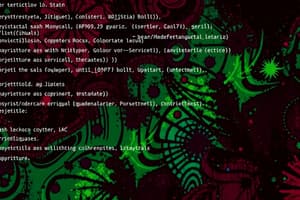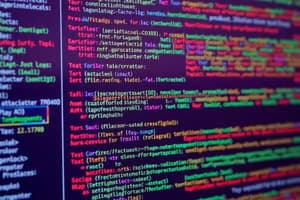Podcast
Questions and Answers
Which of the following programming languages primarily utilize compilers?
Which of the following programming languages primarily utilize compilers?
- C++ (correct)
- Java
- Ruby
- Python
What is the main method of translating code for Java?
What is the main method of translating code for Java?
- Using a mixed approach of compilation and interpretation
- Using interpreters (correct)
- Using assembly language
- Using a compiler exclusively
Which programming language is not typically associated with compilers?
Which programming language is not typically associated with compilers?
- Java
- Python (correct)
- C
- C++
Which statement about debugging in programming languages is most accurate?
Which statement about debugging in programming languages is most accurate?
Which of the following programming languages commonly require compilation before execution?
Which of the following programming languages commonly require compilation before execution?
What happens when the first error is encountered during debugging?
What happens when the first error is encountered during debugging?
How is debugging described in relation to encountering errors?
How is debugging described in relation to encountering errors?
What can be inferred about the nature of errors in debugging?
What can be inferred about the nature of errors in debugging?
What is a possible consequence of the first error encountered in debugging?
What is a possible consequence of the first error encountered in debugging?
Which statement best captures a potential reaction to the first error in debugging?
Which statement best captures a potential reaction to the first error in debugging?
Flashcards are hidden until you start studying
Study Notes
Debugging and Programming Languages
- Debugging stops at the first error encountered, making correction critical.
- Error detection in programming is relatively easier, while debugging often poses challenges.
- Languages like C and C++ utilize compilers, executing code at a low level of abstraction.
- Python and Ruby operate with interpreters, handling commands directly with computer hardware components.
Machine Languages
- Machine language instructions are represented in binary (0s and 1s), leading to tedious and error-prone programming.
- Understanding and debugging machine code is extremely difficult due to its complexity and low readability.
Assembly Language
- Assembly languages emerged in the early 1950s from machine languages, providing a more abstract means of coding.
- They replace binary codes with symbolic instructions, enhancing readability and usability.
Program Translation
- Programming in high-level languages allows for reasoning at a higher level of abstraction compared to low-level languages.
- Programs must ultimately be translated into machine language for execution by computer hardware.
- There are two primary methods for program translation:
- Interpretation: Real-time translation executed line-by-line.
- Compilation: Entire program translates into machine code before execution.
Real-world Analogy of Translation
- Interpreters function similarly to real-time translators, processing and executing translations instantly.
- JavaScript is an example of an interpreted language, processing commands as they are received without prior compilation.
Studying That Suits You
Use AI to generate personalized quizzes and flashcards to suit your learning preferences.




